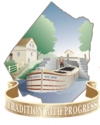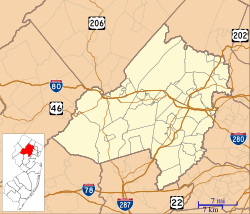Wharton, New Jersey facts for kids
Quick facts for kids
Wharton, New Jersey
|
||
|---|---|---|
|
Borough
|
||

St. Mary's Church, listed on the National Register of Historic Places
|
||
|
||
| Motto(s):
Tradition with Progress!
|
||
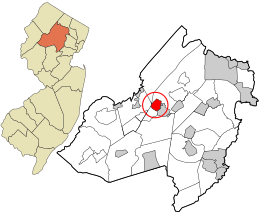
Location in Morris County and the state of New Jersey.
|
||
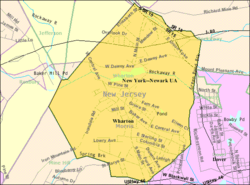
Census Bureau map of Wharton, New Jersey
|
||
| Country | ||
| State | ||
| County | ||
| Incorporated | June 26, 1895 as Port Oram | |
| Renamed | April 16, 1902 as Wharton | |
| Named for | Joseph Wharton | |
| Government | ||
| • Type | Borough | |
| • Body | Borough Council | |
| Area | ||
| • Total | 2.14 sq mi (5.53 km2) | |
| • Land | 2.08 sq mi (5.38 km2) | |
| • Water | 0.06 sq mi (0.15 km2) 2.63% | |
| Area rank | 399th of 565 in state 33rd of 39 in county |
|
| Elevation | 666 ft (203 m) | |
| Population
(2020)
|
||
| • Total | 7,241 | |
| • Estimate
(2023)
|
7,346 | |
| • Rank | 314th of 565 in state 26th of 39 in county |
|
| • Density | 3,494.7/sq mi (1,349.3/km2) | |
| • Density rank | 194th of 565 in state 9th of 39 in county |
|
| Time zone | UTC−05:00 (Eastern (EST)) | |
| • Summer (DST) | UTC−04:00 (Eastern (EDT)) | |
| ZIP Code |
07885
|
|
| Area code(s) | 973 | |
| FIPS code | 3402780390 | |
| GNIS feature ID | 0885443 | |
Wharton is a borough in Morris County, in the U.S. state of New Jersey. As of the 2020 United States census, the borough's population was 7,241, an increase of 719 (+11.0%) from the 2010 census count of 6,522, which in turn reflected an increase of 224 (+3.6%) from the 6,298 counted in the 2000 census.
Wharton was originally incorporated as the borough Port Oram by an act of the New Jersey Legislature on June 26, 1895, created from portions of Randolph Township and Rockaway Township, subject to the results of a referendum passed on the previous day; the name was changed to Wharton on April 16, 1902, based on a referendum held that day and subject to legislation passed on March 27, 1902. The borough was named for Joseph Wharton of the Wharton Steel Company.
Contents
History
In 1831, the Morris Canal was completed from Newark to Phillipsburg, New Jersey across the Delaware River from the terminus of the Lehigh Canal. On the way, it passed through Boonton, Dover and Port Oram. On this route it tapped the Morris County ore fields and became a carrier for both ore and pig iron. Its main purpose, however, was as an extension of the Lehigh Canal to furnish a route for anthracite coal from the Pennsylvania mines to seaboard. Any local traffic was a gain to supplement the through anthracite freight and iron ore and its products soon became important sources of revenue. Sites on the canal were selected for docks and industry, including iron works.
On June 28, 1895, voters from the settlements Port Oram, Irondale, Luxemburg, Maryville and Mount Pleasant voted 143 to 51 to incorporate as the borough Port Oram, the largest of the communities in the area covering 2.25 square miles (5.8 km2) west of Dover, New Jersey. A mayor, six councilmen, an assessor and a collector were elected to govern the new borough which had started life as an ore shipping port on the Morris Canal. These elected officials (mine superintendents, store owners, a railroad superintendent and a school teacher) represented the leaders of these settlements where iron ore was mined, smelted and shipped.
The borough was renamed in 1902 in honor of Joseph Wharton, who was born in 1826 in Philadelphia to an old family of Quakers. Wharton first studied at a local Quaker school after which he worked on a farm rather than attend college because his parents wanted him to mature, and during the winter studied chemistry at the laboratory of Martin Hans Boyè in Philadelphia. He started producing zinc and nickel, and gradually bought a controlling interest in Bethlehem Iron Works. As his business interests expanded he purchased substantial shares of several railroads involved in the coal and iron trade, also purchasing iron mines and furnaces near Port Oram. After selling his interest in Bethlehem Iron Works in 1901 and his nickel works to CVRD Inco in 1902, he continued to actively acquire and manage a large and diverse business empire that included iron smelting in Wharton until just before his death in January, 1909. Wharton also endowed the Wharton School of the University of Pennsylvania. The town was named after him in a referendum in 1902.
In 1984, the long-time local bar The Heslin House and Hartley's Store were destroyed in a gas leak explosion, in which flames as high as 100 feet (30 m) destroyed several area buildings.
Wharton was one of the filming locations for Cyndi Lauper's music video "Time After Time" in 1984.
Geography
According to the United States Census Bureau, the borough had a total area of 2.13 square miles (5.51 km2), including 2.07 square miles (5.37 km2) of land and 0.06 square miles (0.14 km2) of water (2.63%).
The borough borders the Morris County municipalities of Dover, Jefferson Township, Mine Hill Township, Rockaway Township, Roxbury Township.
Unincorporated communities in the borough include Irondale, Luxemburg, Maryville, Mount Pleasant and Port Oram.
Climate
The climate in this area is characterized by hot, humid summers and generally mild to cool winters. According to the Köppen Climate Classification system, Wharton has a humid subtropical climate, abbreviated "Cfa" on climate maps.
Demographics
| Historical population | |||
|---|---|---|---|
| Census | Pop. | %± | |
| 1890 | 775 | — | |
| 1900 | 2,069 | 167.0% | |
| 1910 | 2,983 | 44.2% | |
| 1920 | 2,877 | −3.6% | |
| 1930 | 3,683 | 28.0% | |
| 1940 | 3,854 | 4.6% | |
| 1950 | 3,853 | 0.0% | |
| 1960 | 5,006 | 29.9% | |
| 1970 | 5,535 | 10.6% | |
| 1980 | 5,485 | −0.9% | |
| 1990 | 5,405 | −1.5% | |
| 2000 | 6,298 | 16.5% | |
| 2010 | 6,522 | 3.6% | |
| 2020 | 7,241 | 11.0% | |
| 2023 (est.) | 7,346 | 12.6% | |
| Population sources: 1890 1900–1920 1900–1910 1910–1930 1940–2000 2000 2010 2020 |
|||
2010 census
The 2010 United States census counted 6,522 people, 2,304 households, and 1,590 families in the borough. The population density was 3,039.0 per square mile (1,173.4/km2). There were 2,426 housing units at an average density of 1,130.4 per square mile (436.4/km2). The racial makeup was 75.85% (4,947) White, 4.57% (298) Black or African American, 0.18% (12) Native American, 5.67% (370) Asian, 0.06% (4) Pacific Islander, 9.61% (627) from other races, and 4.05% (264) from two or more races. Hispanic or Latino of any race were 40.33% (2,630) of the population.
Of the 2,304 households, 33.5% had children under the age of 18; 48.1% were married couples living together; 14.8% had a female householder with no husband present and 31.0% were non-families. Of all households, 25.0% were made up of individuals and 10.7% had someone living alone who was 65 years of age or older. The average household size was 2.83 and the average family size was 3.34.
23.9% of the population were under the age of 18, 8.4% from 18 to 24, 28.6% from 25 to 44, 27.4% from 45 to 64, and 11.7% who were 65 years of age or older. The median age was 38.2 years. For every 100 females, the population had 96.9 males. For every 100 females ages 18 and older there were 92.7 males. The Census Bureau's 2006–2010 American Community Survey showed that (in 2010 inflation-adjusted dollars) median household income was $73,571 (with a margin of error of +/− $8,504) and the median family income was $75,176 (+/− $9,601). Males had a median income of $48,750 (+/− $12,951) versus $31,105 (+/− $5,994) for females. The per capita income for the borough was $27,233 (+/− $2,723). About 6.6% of families and 6.8% of the population were below the poverty line, including 8.6% of those under age 18 and none of those age 65 or over.
Parks and recreation
The Hugh Force Canal Park provides hiking trails along the former Morris Canal and abandoned railroad beds. It features Lock 2 East of the canal.
Education
The Wharton Borough School District serves public school students in kindergarten through eighth grade. As of the 2018–19 school year, the district, comprised of two schools, had an enrollment of 738 students and 73.7 classroom teachers (on an FTE basis), for a student–teacher ratio of 10.0:1. Schools in the district (with 2018–19 enrollment data from the National Center for Education Statistics) are Marie V. Duffy Elementary School with 462 students in grades K–5 and Alfred C. MacKinnon Middle School with 271 students in grades 6–8.
Public school students in ninth through twelfth grades attend Morris Hills High School, located in Rockaway Borough, and which also serves portions of Rockaway Borough and Rockaway Township. As of the 2018–19 school year, the high school had an enrollment of 1,279 students and 118.4 classroom teachers (on an FTE basis), for a student–teacher ratio of 10.8:1. The high school is part of the Morris Hills Regional High School District, which also includes students from Denville Township, who attend Morris Knolls High School along with students from parts of Rockaway Borough and Rockaway Township.
Transportation
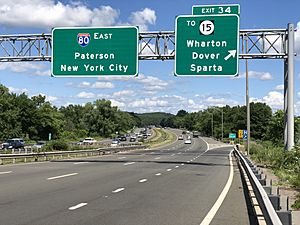
Roads and highways
As of May 2010[update], the borough had a total of 22.12 miles (35.60 km) of roadways, of which 16.67 miles (26.83 km) were maintained by the municipality, 3.31 miles (5.33 km) by Morris County and 2.14 miles (3.44 km) by the New Jersey Department of Transportation.
Interstate 80 runs east-west for about 1.1 miles (1.8 km) and New Jersey Route 15 runs through north–south for 0.9 miles (1.4 km).
Public transportation
NJ Transit offers local bus service on the 880 route, which largely replaced the previous MCM10 route.
Notable people
People who were born in, residents of, or otherwise closely associated with Wharton include:
- Kirk Alyn (1910–1999), the first on-screen Superman, lived during his youth in Wharton, the son of Hungarian immigrants
- Alan Rowe Kelly (born 1959), independent film actor, director, writer and producer, specializing in horror films
- Mayme Schweble (1874–1943), prospector and politician who served in the Nevada Assembly from 1924 to 1926
See also
 In Spanish: Wharton (Nueva Jersey) para niños
In Spanish: Wharton (Nueva Jersey) para niños


